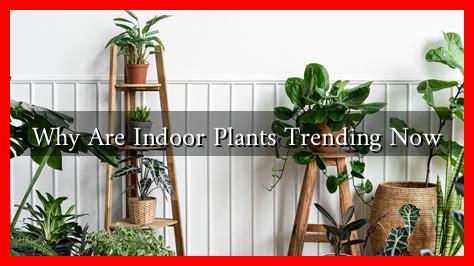-
Table of Contents
Why Are Indoor Plants Trending Now?
In recent years, indoor plants have surged in popularity, transforming homes and offices into lush, green sanctuaries. This trend is not merely a passing fad; it reflects deeper societal shifts and a growing awareness of the benefits that plants bring to our lives. In this article, we will explore the reasons behind the indoor plant trend, the benefits they offer, and how they have become a staple in modern living spaces.
The Rise of Indoor Gardening
Indoor gardening has become a popular hobby for many, especially during the COVID-19 pandemic when people sought solace and comfort in their homes. The trend can be attributed to several factors:
- Increased Time at Home: With remote work and lockdowns, individuals found themselves spending more time indoors, leading to a desire to beautify their living spaces.
- Social Media Influence: Platforms like Instagram and Pinterest have popularized plant aesthetics, showcasing how indoor plants can enhance home decor.
- Accessibility of Information: The internet has made it easier for people to learn about plant care, making it less intimidating for beginners.
Health Benefits of Indoor Plants
Beyond aesthetics, indoor plants offer numerous health benefits that contribute to their rising popularity:
- Improved Air Quality: Plants can filter toxins from the air, improving indoor air quality. According to a study by NASA, certain plants can remove harmful substances like formaldehyde and benzene.
- Stress Reduction: Studies have shown that being around plants can reduce stress and anxiety levels. A 2015 study published in the Journal of Physiological Anthropology found that interacting with indoor plants can lower blood pressure and improve mood.
- Enhanced Productivity: Research from the University of Exeter found that employees working in environments with plants were 15% more productive than those in plant-free spaces.
Design and Aesthetic Appeal
Indoor plants are not just beneficial for health; they also serve as stylish decor elements. The integration of greenery into interior design has become a significant trend:
- Versatile Decor: Plants can complement various design styles, from minimalist to bohemian, making them a versatile choice for homeowners.
- Biophilic Design: This design philosophy emphasizes the connection between humans and nature. Incorporating plants into living spaces aligns with this trend, promoting well-being and comfort.
- Unique Varieties: The availability of unique and exotic plant varieties, such as the Monstera Deliciosa or the Fiddle Leaf Fig, has made indoor gardening more appealing.
Community and Connection
The indoor plant trend has also fostered a sense of community among enthusiasts. Social media groups, local plant swaps, and gardening clubs have emerged, allowing individuals to share tips, experiences, and even plant cuttings. This sense of belonging has made the hobby more engaging and enjoyable.
Case Studies and Statistics
Several case studies highlight the impact of indoor plants on well-being and productivity:
- A 2018 study by the University of Queensland found that employees in offices with plants reported higher job satisfaction and lower levels of stress.
- In a survey conducted by the National Gardening Association, 35% of respondents reported that they started gardening during the pandemic, with many citing mental health benefits as a primary motivation.
Conclusion
The trend of indoor plants is more than just a decorative choice; it reflects a growing awareness of the importance of nature in our lives. From improving air quality and reducing stress to enhancing productivity and fostering community, the benefits of indoor plants are undeniable. As we continue to navigate a world increasingly dominated by technology, the desire to reconnect with nature through indoor gardening will likely persist. Whether you are a seasoned plant parent or a curious beginner, embracing indoor plants can enrich your living space and overall well-being.
For more information on the benefits of indoor plants, you can visit Healthline.


